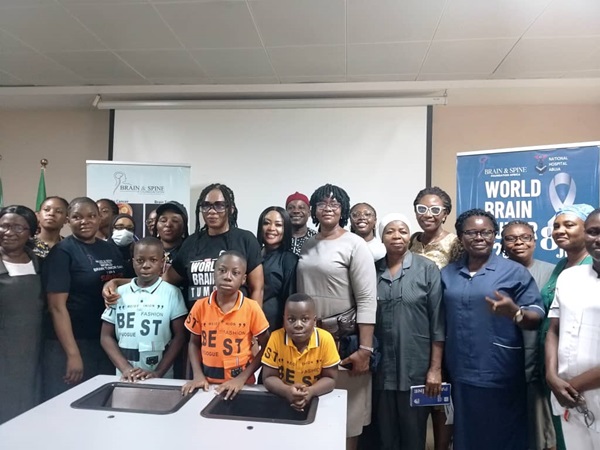
Medical professionals and health advocates have renewed calls for a national brain health policy, urging the Federal Government to prioritise brain tumor care through increased funding, public education, and improved access to diagnosis and treatment.
The appeal was made during a press conference held on Tuesday in Abuja to mark the 2025 World Brain Tumor Day. The event was organised by the Brain and Spine Foundation Africa in collaboration with the National Hospital.
Speaking at the event, head consultant neurosurgeon at the National Hospital, Dr. Mansur Idris stated that brain tumors account for up to 25 per cent of all neurosurgical cases in Nigeria. Idris, represented by fellow neurosurgeon, Dr. Uthman Uthman delivered a keynote address titled “Hope Amid Tumour: Advances in Care and Survivorship.”
He noted that many Nigerians remain unaware of the early warning signs of brain tumors due to widespread cultural misconceptions and a lack of health education.
“Seizures or sudden behavioural changes are often misinterpreted as spiritual attacks. In some cases, tumors are only discovered incidentally during scans for unrelated issues,” he said.
He explained that while not all brain tumors are malignant, even benign growths can cause serious complications when left untreated. However, access to diagnostic tools such as Magnetic Resonance Imaging (MRI) remains a major barrier.
“MRI and other advanced diagnostic tools are either unavailable or unaffordable for the vast majority of Nigerians,” he stated.
Although he acknowledged the arrival of new healthcare facilities such as the African Medical Centre of Excellence (AMCE) in Abuja, he stressed that sophisticated services like Tesla MRI and PET scans remain financially out of reach for most patients.
He further explained that treating brain tumors requires a multidisciplinary approach involving neurosurgery, radiology, oncology, pathology and long-term follow-up care. The financial burden, he warned, is often crushing.
“Without financial support, patients and their families are left struggling emotionally and economically,” he said, calling on the government to replicate the cancer care financing model for brain tumor patients and include brain health in the national health agenda.
Executive director of the Brain and Spine Foundation Africa, Engr. Chika Okwuolisa described brain tumors as a “silent national crisis” that has been neglected for far too long.
“Brain health has long been relegated to the background. It’s time to bring it to the centre of our health conversation in Nigeria,” she said.
Drawing from personal experience, she recounted the painful journey of supporting her sibling who was diagnosed with a brain tumor, a struggle that forced her family to publicly solicit funds just to begin treatment.
“I’ve lived through that nightmare. That’s why I believe brain health should not be a private burden. It’s a public health issue that demands a systemic response,” she said.
She also announced the upcoming African Neurological Health Summit, a gathering aimed at driving sustained advocacy and policy engagement to elevate brain health in Africa’s broader healthcare priorities.
Former president of the International College of Surgeons, Gen. Maurice Ezeoke (Rtd) also lent his voice, highlighting cost as a major barrier to timely care. He urged the government to include brain tumour treatment in the national health insurance scheme and consider introducing targeted subsidies for patients.
Also speaking at the event, a senior oncology nurse at the National Hospital, Ekeinyi Adedayo encouraged Nigerians to pay close attention to persistent symptoms such as chronic headaches, vision changes and seizures, warning that early diagnosis is often critical to survival.
“Brain health must be taken seriously. Regular check-ups and seeking medical help at the first signs of trouble can save lives,” she said.
The event also featured moving testimonies from survivors and caregivers. One of the most emotional moments came from Stephanie Acka, whose sister was diagnosed with a brain tumor in 2021. She recounted how her family had to raise over N10 million through public donations to afford life-saving surgery in India.
“The struggle didn’t end with the surgery. We still spend as much as N1.2 million every month on medications,” she said. “I’ve had to beg just to keep my sister alive. We need government support to reduce this burden.”
Science Nigeria reports that World Brain Tumor Day, observed globally every June 8, serves as a call to action to raise awareness about one of the most devastating yet overlooked health conditions in the world.
This year’s theme, “Fighting Brain Cancer Together,” underscores the urgent need for equity in care, research funding and support for survivors.
As Uthman succinctly put it, “It’s not enough to have a few experts or high-end machines. If patients can’t afford or access care, it makes no difference.”
For advocates like Okwuolisa and countless families across Nigeria, the message remains clear: brain health can no longer be sidelined. The time for coordinated action is now.

